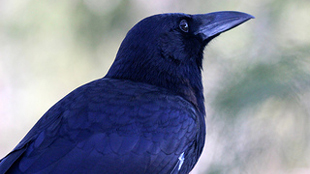 FLICKR, CUATROK77Antibiotic resistance is an increasing problem around the world, but the various ways that bacteria gain resistance genes are still not well understood. Now, researchers from Tufts University in Massachusetts, Binghamton University in New York, the University of California, Davis, and the University of Veterinary and Pharmaceutical Sciences Brno in the Czech Republic have found vancomycin-resistant Enterococci (VRE) in fecal samples from American crows (Corvus brachyrhynchos), which live in close proximity to humans in urban areas. Their work was published online this summer (August 6) in Environmental Microbiology.
FLICKR, CUATROK77Antibiotic resistance is an increasing problem around the world, but the various ways that bacteria gain resistance genes are still not well understood. Now, researchers from Tufts University in Massachusetts, Binghamton University in New York, the University of California, Davis, and the University of Veterinary and Pharmaceutical Sciences Brno in the Czech Republic have found vancomycin-resistant Enterococci (VRE) in fecal samples from American crows (Corvus brachyrhynchos), which live in close proximity to humans in urban areas. Their work was published online this summer (August 6) in Environmental Microbiology.
“We’ve documented human-derived drug resistance where it shouldn’t be—in wildlife and the environment,” study coauthor Julie Ellis of Tufts University told Environmental Health News. “But we know very little about how this may impact public health.”
Ellis and colleagues collected 590 samples crow feces from four different locations in the United States—in California, Kansas, New York, and Massachusetts. They found that Enterococci in 2.5 percent of the samples carried vanA, one of nine vancomycin-resistance genes. In addition to being resistant to vancomycin, bacterial strains that the research team isolated were also resistant to other antibiotics, including erythromycin, ampicillin, and ciprofloxacin. The authors suggested in their paper that VRE could be spread by refuse from medical centers, and that because crows feed on garbage in urban ...





















